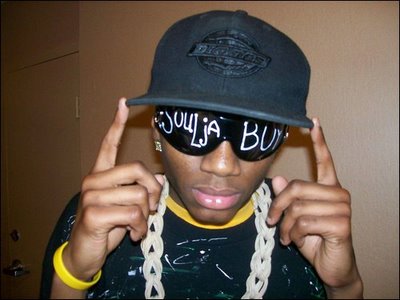Entries in Trademark Infringement (368)
Texas High School To Change Logo Following WSU's Demands
Washington State University has caused a Texas high school to change its school logo, the Spokesman-Review stated yesterday. WSU believes Albilene, Tex.’s Cooper High School’s cougar head logo is too similar to its own cougar head logo. The high school has agreed to make the change.
Cooper Principal Gail Gregg said the school’s lawyers advised they didn’t have much of a chance to win the dispute.
“They advised us that if we fought it, there’s a slim chance we’d win, and if we got there it’d cost us more in legal fees than it would to replace all the logos.”

Confusingly similar? Cooper High School’s logo (left)
and WSU’s logos c.1964 (middle) and today
The cost to change the logo nonetheless will be big.
Mr. Gregg told the Abilene Reporter-News: “I’m going to shoot from the hip and say that it could be $40,000 to $50,000. [A]s you come on the campus, it’s just everywhere. It’s on just about every piece of our uniforms. It’s on our IDs. It’s on our trash cans. It’s on the gym floor. It’s on the gym wall. It’s on the scoreboard at Shotwell [Stadium].”
WSU reportedly adopted its logo in 1964, which it revised by adding the letters “WSU” in 1995. Cooper reportedly first used its logo in the 1960s, discontinued it for a time, and then brought it back in the early 1990s. WSU also reportedly discontinued its original logo for a time, though details are unclear.
Patent and Trademark Office records show WSU owns a registration for its current logo, which it obtained in 1984. WSU claims a first-use date of November 1959. I did not find any registration for its reportedly earlier design without the “WSU” lettering.
Mr. Gregg said he did not know who designed his school’s logo but thought the person must have had “strong ties to Washington State.”
WSU will give Cooper time to make the change. Both sides said they understand each other’s perspective and described their relationship as being cooperative.
Anesthesiologist Agrees to Judgment and Permanent Injunction
 In October, STL reported on a Seattle doctor who had been sued by the American Board of Anesthesiology, Inc., for allegedly passing himself off as a board-certified anesthesiologist by using the ABA’s certification mark on credentialing documents. Today, Ray P. Liao, M.D., consented to the entry of judgment in favor of the ABA.
In October, STL reported on a Seattle doctor who had been sued by the American Board of Anesthesiology, Inc., for allegedly passing himself off as a board-certified anesthesiologist by using the ABA’s certification mark on credentialing documents. Today, Ray P. Liao, M.D., consented to the entry of judgment in favor of the ABA.
Dr. Liao also agreed to a permanent injunction enjoining him from “Directly or indirectly using or infringing upon the Plaintiff’s certification marks”; “Engaging in any acts or activities directly or indirectly calculated to trade upon the Plaintiff’s certification marks, or the reputation and goodwill of the Plaintiff”; and “Making any representation, including any use of brochures, letterhead, business cards, curriculum vitae or other written information indicating or implying that [he] is certified by the Plaintiff or is a Diplomate of the American Board of Anesthesiology unless and until the Defendant hereafter properly and lawfully becomes certified as a Diplomate by the Plaintiff by taking and passing all oral and written examinations and meeting all other criteria necessary for certification.”
Dr. Liao previously had stipulated to a preliminary injunction containing similar terms.
The case cite is American Board of Anesthesiology, Inc. v. Liao, No. 07-1458 (W.D. Wash.).
Striking Writers Chide Producers with Protest Web Site
 The Los Angeles Times today reported that Hollywood’s striking writers have acquired the amptp.com and amptp.net domain names and launched a Web site that protests the Alliance of Motion Picture and Television Producers, which represents the studios in the parties’ labor dispute. AMPTP’s official site is associated with amptp.org.
The Los Angeles Times today reported that Hollywood’s striking writers have acquired the amptp.com and amptp.net domain names and launched a Web site that protests the Alliance of Motion Picture and Television Producers, which represents the studios in the parties’ labor dispute. AMPTP’s official site is associated with amptp.org.
The story begins with the observation: “When the Hollywood studios say they don’t know enough about the Internet to pay writers what they seek for the streaming and downloading of their shows, they might not be kidding.”

The protest site, which looks like the producers’ official site, states the Alliance was “heartbroken” that negotiations with the writers had failed “despite our best efforts, including sending them a muffin basket, making them a mixed CD and standing outside their window with a boombox blasting Peter Gabriel songs.” It also features links to news stories supporting the writers.
The story quotes me as saying I didn’t see a problem with the writers using the Alliance’s trademark in a domain name as long as the Web site is a protest site and doesn’t cause consumer confusion: “It’s perfectly defensible for a disgruntled party to use someone else’s trademark if the purpose is to protest. It would be improper only if the writers were attempting to confuse the public or sell something.”
Having now had the chance to see the site, it’s clear the site is protected as free speech. And, since it doesn’t sell anything, it does not even implicate the Lanham Act because it is not “commercial.” Even if it were commercial, I don’t think confusion is likely given the site’s lampooning content. If the writers nonetheless wanted to minimize possible liability, they could provide a disclaimer and link to the Alliance’s official site, per Taubman Co. v. Webfeats, 319 F.3d 770 (6th Cir. 2003). As a non-commercial site, however, likelihood of confusion shouldn’t enter into the analysis.
Latest Band Name Dispute Pits Souljah Boy Against Soulja Boy

Photo credit: musikizme.com
As STL readers know, I love a good band name dispute. The latest involves Little Willie Lyons, a/k/a “Souljah Boy,” who filed suit yesterday in the District of Nevada against fellow rapper Deandre Way, a/k/a “Soulja Boy,” Mr. Way’s manager, and Mr. Way’s publishers. Mr. Lyons claims that SOULJA BOY infringes and dilutes his common law rights in SOULJAH BOY (with an “H”).
Mr. Lyons states he has sold millions of records as “Souljah Boy,” and has been featured in “volumes of advertising, magazine articles and other media since 1995 in the continental United States and abroad.”
Mr. Way is one of the most popular musicians today. In September, his single “Crank That (Soulja Boy)” reached number one on Billboard’s Hot 100 chart based on national sales and radio play.
In an application to register SOULJA BOY with the Patent and Trademark Office, Mr. Way claimed he first used his mark in commerce in 1997 (though he also claimed a first use date of 2007 and his debut album, “Souljaboytellem.com,” was released this year).
If Mr. Lyons indeed can show priority, and continuous use, he’s probably got a winner.
The case cite is Lyons v. Way, No. 07-1635 (D. Nev.).
MEECO and True Value Settle Infringement Suit
 On April 5, STL reported on a Western District order dismissing on copyright preemption grounds unfair competition and unjust enrichment claims MEECO Manufacturing Co., Inc., had brought against True Value Co. MEECO claimed in the suit True Value uses and displays images of MEECO’S RED DEVIL fireplace products in its electronic catalog without authorization and ships competing products when it receives orders for those products. The court found the product labels and logo at issue came within the subject matter of MEECO’s copyright registrations and the unfair competition and unjust enrichment claims really amounted to a copyright claim.
On April 5, STL reported on a Western District order dismissing on copyright preemption grounds unfair competition and unjust enrichment claims MEECO Manufacturing Co., Inc., had brought against True Value Co. MEECO claimed in the suit True Value uses and displays images of MEECO’S RED DEVIL fireplace products in its electronic catalog without authorization and ships competing products when it receives orders for those products. The court found the product labels and logo at issue came within the subject matter of MEECO’s copyright registrations and the unfair competition and unjust enrichment claims really amounted to a copyright claim.
Yesterday, Judge Robert Lasnik granted the parties’ agreed motion to dismiss MEECO’s claims against True Value. The order does not affect True Value’s claims against Imperial Sheet Metal, Ltd., and Imperial Manufacturing Group, which True Value joined in May as third-party defendants. The third-party complaint alleges that Imperial is responsible for any trademark infringement the court finds in the case.
The case cite is MEECO Manufacturing Co., Inc. v. True Value Co., No. 06-1582 (W.D. Wash.).